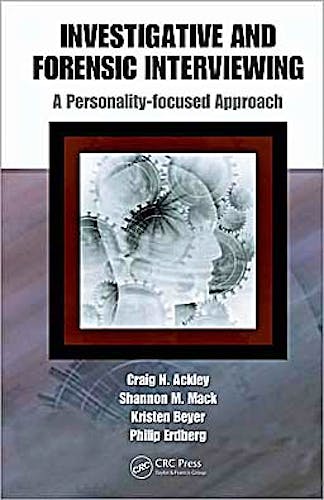

No hay productos en el carrito



Investigative and Forensic Interviewing: A Personality-Focused Approach
Erdberg, P. — Ackley, C.N. — Beyer, K. — Mack, S.M.
1ª Edición Diciembre 2010
Inglés
Tapa dura
196 pags
1000 gr
15 x 23 x 2 cm
ISBN 9781420084252
Editorial CRC PRESS
LIBRO IMPRESO
-5%
168,74 €160,30 €IVA incluido
162,25 €154,13 €IVA no incluido
Recíbelo en un plazo de
2 - 3 semanas
DESCRIPTION
Experienced investigators know that taking an interviewee’s personality into account can lead to a more productive interview outcome. This volume provides a window into the personality types most commonly encountered in the legal system and demonstrates how to use this insight to plan and conduct effective interviews. The personality types discussed include narcissistic, antisocial, psychopathic, borderline, inadequate/immature, paranoid, and schizotypal. The book is designed for law enforcement officers, attorneys, probation and parole officers, mental health workers, and anyone else who interviews witnesses, suspects, and offenders throughout the legal system.
TABLE OF CONTENTS
Chapter 1 Introduction
Purpose of This Book
How to Use This Book
Vignette
Description of the Personality
Assessing the Individual
Preparation Issues
The Interview
Key Points to Remember
Interview versus Interrogation
Legal and Policy Considerations
Reference
Chapter 2 The Narcissistic Personality
Introduction
Description of the Oblivious Narcissist
Assessing the Oblivious Narcissist
Preparation Issues
Understanding Your Reactions to the Individual
Who Should Conduct the Interview
Number of Interviewers
Physical Space/Environment/Interpersonal Space
Nonverbal Behavior
Questions
Recording the Interview (Notetaking, Audio/Video Recording)
Time Frame
The Interview
Key Points to Remember
Do
Don’t
Description of the Vulnerable Narcissist
Assessing the Vulnerable Narcissist
Preparation Issues
Understanding Your Reactions to the Individual
Who Should Conduct the Interview
Number of Interviewers
Physical Space/Environment/Interpersonal Space
Nonverbal Behavior
Questions
Recording the Interview (Notetaking, Audio/Video Recording)
Time Frame
The Interview
Key Points to Remember
Do
Don’t
References
Chapter 3 The Antisocial Personality
Description of the Antisocial Personality
Assessing the Antisocial Personality
Important Areas and Nature of Inquiry
Questions
Sources of Information
Preparation Issues
Understanding Your Reactions to the Individual
Who Should Conduct the Interview
Number of Interviewers
Physical Space/Environment/Interpersonal Space
Nonverbal Behavior
Questions
Recording the Interview (Notetaking, Audio/Video Recording)
Time Frame
Review of Records
The Interview
Key Points to Remember
Do
Don’t
Reference
Chapter 4 The Psychopathic Personality
Description of the Psychopathic Personality
Views of Self and Others
Low Levels of Fear and Anxiety
Emotional Deficiencies
Associated Features
Assessing the Psychopathic Personality
Core Questions
The Disciplined Psychopath
The Undisciplined Psychopath
Preparation Issues
Understanding Your Reactions to the Individual
Who Should Conduct the Interview
Number of Interviewers
Physical Space/Environment/Interpersonal Space
Nonverbal Behavior
Questions
Recording the Interview (Notetaking, Audio/Visual Recording)
Time Frame
The Interview
Attacking and/or Hostile Behavior
Friendly and Charming Behavior
Sexually Manipulative Behavior
"Game" Behavior
General Considerations
Key Points to Remember
Do
Don’t
Reference
Chapter 5 The Borderline Personality
Description of the Borderline Personality
Assessing the Borderline Personality
Preparation Issues
Understanding Your Reactions to the Individual
Who Should Conduct the Interview
Number of Interviewers
Physical Space/Environment/Interpersonal Space
Nonverbal Behavior
Questions
Recording the Interview (Notetaking, Audio/Video Recording)
The Interview
Key Points to Remember
Do
Don’t
References
Chapter 6 The Inadequate / Immature Personality
Description of the Inadequate/Immature Personality
Assessing the Inadequate/Immature Personality
Preparation Issues
Understanding Your Reactions to the Individual
Who Should Conduct the Interview
Number of Interviewers
Physical Space/Environment/Interpersonal Space
Nonverbal Behavior
Questions
Recording the Interview (Notetaking, Audio/Video Recording)
Time Frame
The Interview
Key Points to Remember
Do
Don’t
Reference
Chapter 7 The Paranoid Personality
Description of the Paranoid Personality
Assessing the Paranoid Personality
Preparation Issues
Understanding Your Reactions to the Individual
Who Should Conduct the Interview
Number of Interviewers
Physical Space/Environment/Interpersonal Space
Nonverbal Behavior
Questions
Recording the Interview (Notetaking, Audio/Video Recording)
Time Frame
The Interview
Key Points to Remember
Do
Don’t
References
Chapter 8 The Schizotypal Personality
Describing the Schizotypal Personality
Assessing the Schizotypal Personality
Preparation Issues
Understanding Your Reactions to the Individual
Who Should Conduct the Interview
Number of Interviewers
Physical Space/Environment/Interpersonal Space
Nonverbal Behavior
Questions
Recording the Interview (Notetaking, Audio/Video Recording)
Time Frame
The Interview
Key Points to Remember
Do
Don’t
References
Appendix A
The Dimensional View of Personality
Personality: A Constellation of Traits
The Personality Continuum: Style versus Disorder
The Relationships Between Personality Types
Borderline, Narcissistic, and Antisocial Personalities
Narcissistic, Antisocial, and Psychopathic Personalities
The Borderline, Narcissistic, Antisocial, Psychopathic Continuum
References
Appendix B: Glossary
Index
AUTHOR BIOGRAPHY
Craig N. Ackley, M.S., is a former supervisory special agent with the FBI. He retired from the Behavioral Analysis Unit (BAU) of the FBI’s National Center for the Analysis of Violent Crime where he provided psychological and behavioral support primarily in the areas of sexual assault, domestic violence, stalking, and homicide. He is currently the president of Behavioral Science Education and Consultation Services, Inc.
Shannon McAuliffe Mack, M.A., is a former senior research analyst with the FBI’s National Center for the Analysis of Violent Crime, where she provided research support and case-specific operational assistance. She is currently vice president of Behavioral Science Education and Consultation Services, Inc., where she provides operational assistance and training in the areas of trial strategy, interview strategy, and case analysis.
Kristen Beyer, Ph.D., is a licensed clinical psychologist who formerly worked in the FBI’s National Center for the Analysis of Violent Crime as the supervisory social/behavioral science research coordinator where she provided consultation, training, and research on violent crime matters. She is currently a consultant with Behavioral Science Education and Consultation Services, Inc. and an adjunct professor.
Philip Erdberg, PhD, is a diplomate in clinical psychology of the American Board of Professional Psychology. He is a past president of the Society for Personality Assessment, the 1995 recipient of the Society’s Distinguished Contribution Award, and the 2001 recipient of the Outstanding Achievement Award of the Forensic Mental Health Association of California. He consults in a variety of school, clinical, correctional, and law enforcement settings and is a frequent workshop presenter.
© 2025 Axón Librería S.L.
2.149.0